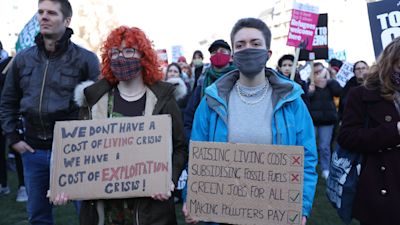Campaigners march on Parliament Square to challenge the cost of living crisis

Campaigners have gathered in London's Parliament square today to protest about the cost of living crisis.
It's one of many protests - organised by social organisation The People's Assembly - taking place across the UK. It's been sparked by energy regulator Ofgem's announcement that the energy price cap will rise by 54% from the 1 April this year.
They blame the current government for the cost of living crisis and their handling of it.
In a video posted on social media, one protestor can be heard saying: "We say the sums aren't adding up. A strong economy is an one where you - and I - can live with dignity and security and have our basic living standards guaranteed."
MP Jeremy Corbyn also showed support for the protests on his social media.
He said: "We must stand together against the soaring cost of living and fight for a wealth tax."
In response to the energy crisis, the Chancellor of the exchequer, Rishi Sunak, has implemented a one-off repayable £200 discount and a rebate on council tax bills. It's a part of his £9bn package which aims to help those struggling with the essentially £700 increase in household energy bills from April.
Speaking to the House of Commons on 3rd February 2020, Rishi Sunak said: "The price cap has meant that the impact of soaring gas prices has so far fallen mainly on energy companies. So much so, that some suppliers who couldn’t afford to meet those extra costs have gone out of business as a result. It is not sustainable to keep holding the price of energy artificially low."
Rishi Sunak also called the Government's £200 discount 'just one part' of their plan to tackle the country's 'most pressing economic challenges.'
He said: "What we can do is, take the sting out of a significant price shock for millions of families, by making sure the increase in prices is smaller initially and spread over a longer period."